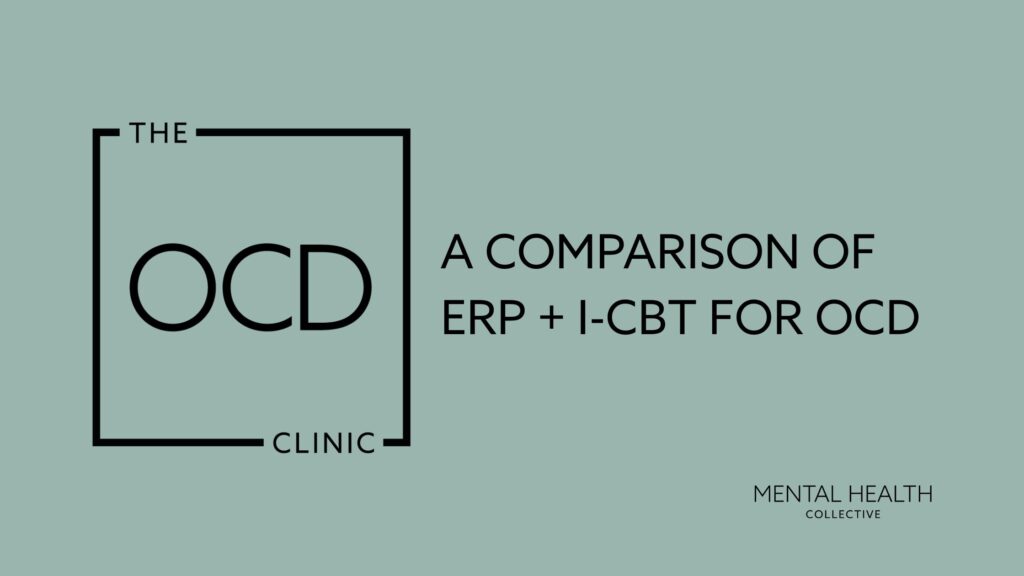The Mental Health Collective is dedicated to advancing precision in therapeutic intervention, continually assessing the clinical merit of established and emerging treatments for OCD. We understand that achieving symptom reduction hinges upon an individualized care plan. When comparing Exposure and Response Prevention (ERP) and Inference-Based Cognitive Behavioral Therapy (I-CBT), the decision is not one of complementarity, but one of foundational strategy. Let’s delve into the distinct theoretical models and mechanisms of change that mandate the selection of one approach as the primary therapeutic focus, and illuminate why these powerful, yet divergent, treatments are not utilized in tandem.
Exposure and Response Prevention (ERP)
ERP is the most researched and most popular behavioral treatment for OCD. It involves gradually and systematically exposing a person to feared thoughts, images, or situations (exposure) while preventing their usual compulsions or avoidance behaviors (response prevention). Over time, this weakens the association between obsessions and compulsions, improving overall quality of life.
Inferential Cognitive Behavioral Therapy (I-CBT)
Inferential-Based CBT is an evidence-based treatment for OCD that offers a cognitive pathway to recovery. Unlike approaches that focus on compulsions, I-CBT targets the obsessive reasoning process that fuels doubt. Central to this is inferential confusion- the mechanism by which sufferers confuse possibility with reality, distrusting their direct experience and relying instead on imagined scenarios.
I-CBT proposes that OCD symptoms stem from this confusion: when imagination takes priority over sensory information, everyday situations are treated as if they contain hidden danger. Treatment guides clients to recognize when they are engaging in obsessional reasoning, to distinguish imagination from reality, and to see that obsessional doubts naturally lose their weight once understood at their source.
COMPARING ERP + I-CBT
ERP
Pros:
- Strongest evidence base; widely considered the frontline treatment.
- Directly targets compulsions and avoidance, leading to measurable behavioral change.
Cons:
- Often experienced as distressing or overwhelming, potentially impacting early dropout rates.
- Some clients feel it doesn’t address the reasoning behind obsessions or lead to the resolution of doubts.
I-CBT
Pros:
- Focuses on the cognitive roots of obsessions (inferential doubt), rather than just managing compulsions.
- Focuses on obsessional reasoning and compares it to normal reasoning
- Doesn’t require behavioral intervention
- It can provide deeper insight into how thoughts and doubts develop.
Cons:
- Evidence base is growing, but it is newer than ERP, so less research has been completed and published.
- Requires strong abstract reasoning skills, which may not suit all clients.
- Not as widely available; fewer trained clinicians compared to ERP.
Is ERP OR I-CBT A BETTER CHOICE?
The choice between Exposure and Response Prevention (ERP) and Inference-Based Cognitive Behavioral Therapy (I-CBT) must be a deliberate and clinically reasoned one, grounded in a thorough case formulation that extends beyond symptom presentation to include the biological and environmental factors for every client.
- ERP is first-line treatment for OCD and is tolerated by many clients. ERP has a strong evidence base and is the most popular treatment for OCD across all genders and ages. This is the first treatment most clients should choose to determine if they can benefit from treatment.
- I-CBT is a strong intervention, especially when exposures (ERP) are not tolerated due to high sensory sensitivity (acute PTSD hyper vigilance or autistic sensory sensitivities that can dysregulate the nervous system). It can also be useful for clients who are highly reflective or analytical. It is a great treatment for clients who have not had success with ERP or are too acutely impacted by behavioral interventions.
The Mental Health Collective’s OCD Clinic team is skilled in carefully determining which model provides the most accessible and sustainable route to symptom resolution for the unique individual presenting for care.
DO YOU HAVE A QUESTION?
Send our team a message or call 888.717.9355
